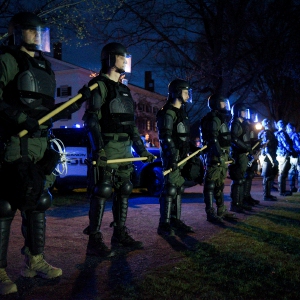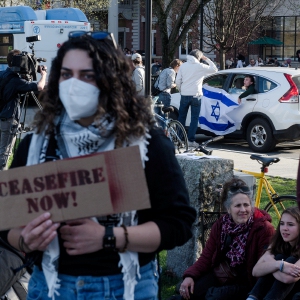Should hospital guards carry guns? State hospital an outlier in saying yes.
| Published: 01-08-2024 4:21 AM |
November’s fatal shootings of an unarmed security officer and former patient inside the state psychiatric hospital could lead to a major policy change that most other hospitals in the state have considered and rejected: armed security guards.
In interviews, security officers at several hospitals cited concerns that a firearm in a volatile situation could exacerbate, not mitigate, safety risks to patients, visitors, and staff. And they cautioned that a gun in a hospital setting could take away from what should be a welcoming and therapeutic environment.
Even with what they described as an increased prevalence of workplace violence against staff, from verbal abuse and threats to hitting and choking, the security officials expressed a preference for other safety measures, such as stun guns, pepper spray, handcuffs, and ongoing de-escalation training.
John Duval, head of security at Concord Hospital, said the number of “code gray” calls for “aggressive, out-of-control” individuals dropped from 30 in 2017 to five this year, in part by increasing security “standbys” in cases where staff anticipate a problem. Officers were unarmed during those 14,870 standbys this year, he said.
“For me, that’s an example of, as a precautionary measure, we utilize security to de-escalate,” Duval said. He said the hospital has at times placed an armed Concord police officer outside the room of a patient who poses a threat.
Catholic Medical Center in Manchester has also chosen not to use armed hospital security except in extreme cases where it calls in a Manchester police officer.
“Security staff assist medical staff in really close proximity to patients,” said John Patti, a retired Manchester police officer who oversees security at the hospital. “To have a firearm that close to patients, I think it’s certainly risky.”
Mental health advocates have voiced similar concerns following the deaths of officer Bradley Haas, whom many patients and families knew by first name, and John Madore, who had been a patient at the New Hampshire Hospital and worked as a peer counselor.
Article continues after...
Yesterday's Most Read Articles
 Killington is the East’s largest ski resort. A developer wants to expand on that in a big way.
Killington is the East’s largest ski resort. A developer wants to expand on that in a big way.
 Kenyon: Dartmouth shows it has no patience for peaceful protest
Kenyon: Dartmouth shows it has no patience for peaceful protest
 Claremont movie theater to close at end of May
Claremont movie theater to close at end of May
 A Look Back: Upper Valley dining scene changes with the times
A Look Back: Upper Valley dining scene changes with the times
 Lebanon High senior comes to the aid of driver with health problem
Lebanon High senior comes to the aid of driver with health problem
 Dartmouth moves swiftly to stymie demonstration, leads to 90 arrests
Dartmouth moves swiftly to stymie demonstration, leads to 90 arrests
Susan Stearns, executive director of NAMI New Hampshire, also cited a concern that guns in treatment hospitals could retraumatize patients who’ve been involuntarily committed and transported to the hospital by armed police officers, possibly in shackles.
“There is absolute broad consensus that it would be dangerous to both patients and staff to have firearms allowed on patient units,” said Stearns. “In a situation that is volatile, the risk of a firearm being used is really significant. I am really concerned, frankly, that it would be used on a patient.”
The Department of Safety announced the security changes just 11 days after the Nov. 17 shootings, far too quickly, some have said, given that law enforcement was still investigating the incident. It is unclear, though, when the Department of Health and Human Services intends to enact the policy change and arm its security officers with firearms.
When safety officials announced their security recommendations, they said the policy change was “in progress.” Their additional recommendation that the state hospital hire armed private security guards was also in progress, they said.
Jake Leon, spokesman for DHHS, did not provide a timeframe, saying only that the department is at the “beginning” of implementing the recommendations. It is also unclear whether security officers would carry firearms in patient areas, but that appears to be a possibility.
The hospital’s security officers, according to the department’s recommendations, would “carry firearms throughout the hospital to mitigate any threats occurring within the (New Hampshire Hospital).” The new armed private security officers would be stationed at the hospital entrance to screen patients, visitors, and staff, according to the recommendations, but also be used to assist hospital security officers “throughout” the campus.
That concerns Stearns and NAMI New Hampshire families who have visited loved ones at the state hospital.
“They talked about how intimidating it would be to have someone who’s carrying a firearm there at the door … and how that would have certainly added to their experience in terms of anxiety and concern,” Stearns said. “And we really want to be careful that we’re not criminalizing people with mental illness.”
Her community saw Hass as part of the hospital therapeutic team, not a security officer, she said. A NAMI New Hampshire volunteer told Stearns how helpful he’d been when she had encountered him at a security checkpoint while visiting her son.
“He talked to her about things that were OK (to bring in) and then made other suggestions of things she might want to bring next time,” Stearns said. “Just, you know, really caring.”
Leon said: “Any changes made to enhance security will be evidence-based and trauma-informed” and balance quality care and safety. The department intends to get input from a diverse group of stakeholders, he said.
Stearns said she has already shared her thoughts.
Those include ensuring private security guards be trained in handling behavioral health crises just as hospital security officers are. Leon said in an email they would. And she’s asked the department to reach out to families and individuals who have personal experiences with behavioral health challenges.
Fatal attacks in health care settings are rare. Between 2011 and 2018, 156 health care workers were killed at work nationwide, nearly 29% of them by a relative or partner, according to the most recent federal Department of Labor data. Fourteen percent of victims were killed by a patient.
Nonfatal violence and hostile words, however, are not rare.
In 2018 alone, the federal Department of Labor recorded 15,230 nonfatal workplace injuries and illnesses among health care workers. The majority of incidents took place in hospitals, particularly psychiatric and substance abuse hospitals, according to the federal data.
In describing the security needs of a behavioral health hospital, Leon cited that distinction.
“The New Hampshire Hospital is unique in the population it serves, so it is hard to compare its policies to those of other hospitals,” he said.
Patti had been with the Manchester police for years when he was named director of security at Catholic Medical Center a decade ago. He said he was “shocked” to see the behavior hospital staff were experiencing.
“An extreme outlier would be what happened up at New Hampshire Hospital,” Patti said. “On a regular basis, we have staff who get punched, kicked, bitten, spit on, and verbally abused.”
Terrence O’Hara was no less taken aback when he became director of security and transportation at Wentworth-Douglass Hospital in Dover in 2020 after 22 years as a Tucson, Arizona, police officer.
“Once I got into health care and saw it on a daily basis, I was like, ‘Holy smokes,’” O’Hara said. “The volatile people that come in the emergency room, whether they’re under the influence of alcohol and drugs, or suffering from a mental health crisis, or a combination of all three, the volatility and violence that you see on a daily basis … is certainly stunning.”
The challenge is knowing how to prepare for those incidents and how best to respond.
Security officials said those decisions require detailed data collected over time that tracks not only what, where, how, and when an incident happened but why.
Concord Hospital’s Duval said, for example, a patient who is agitated and acting out due to dementia and one acting out of anger call for different security responses.
Without that information, it’s impossible to meaningfully identify patterns of violence, security vulnerabilities, and opportunities for improvements, security officials said.
While hospitals track that information internally, according to their own procedures, there is no statewide data to understand what is happening across hospitals and how hospitals are responding.
That’s changing.
Patti helped write legislation in 2022 that created a commission to gather statewide data on the prevalence and type of hostile and violent behavior health care workers are experiencing. That commision held its first meeting last month and will report out its findings, said Duval, the vice chairperson.
In a national poll last year, the American College of Emergency Physicians asked emergency department physicians to rank options for improving security in their hospitals. Communicating and enforcing security plans and increasing security measures such as cameras, visitor screening, and visibility of security officers topped the list.
Arming officers was not a suggested option, and doing so is rare in New Hampshire.

 Three vie for two Hanover Selectboard seats
Three vie for two Hanover Selectboard seats
